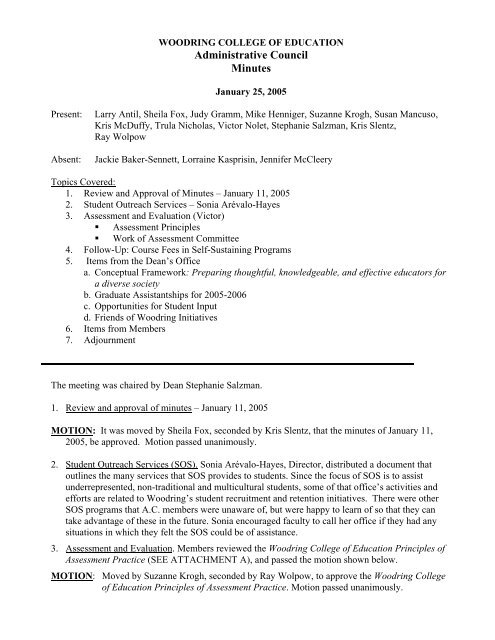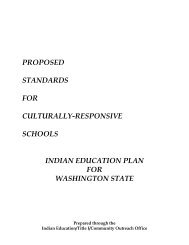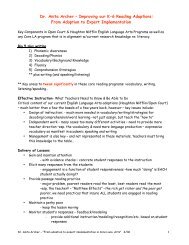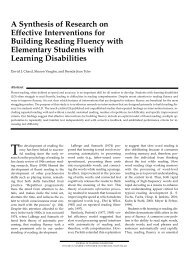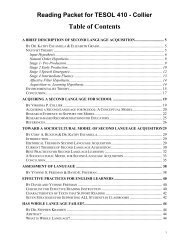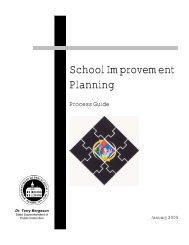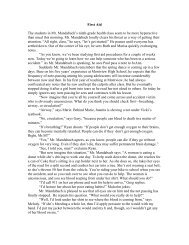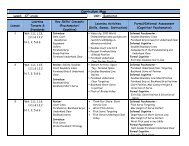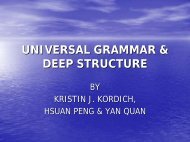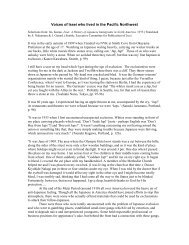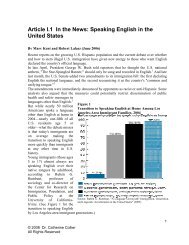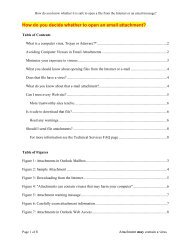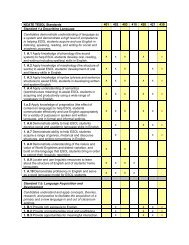January 25 - Woodring College of Education - Western Washington ...
January 25 - Woodring College of Education - Western Washington ...
January 25 - Woodring College of Education - Western Washington ...
Create successful ePaper yourself
Turn your PDF publications into a flip-book with our unique Google optimized e-Paper software.
WOODRING COLLEGE OF EDUCATIONAdministrative CouncilMinutes<strong>January</strong> <strong>25</strong>, 2005Present:Absent:Larry Antil, Sheila Fox, Judy Gramm, Mike Henniger, Suzanne Krogh, Susan Mancuso,Kris McDuffy, Trula Nicholas, Victor Nolet, Stephanie Salzman, Kris Slentz,Ray WolpowJackie Baker-Sennett, Lorraine Kasprisin, Jennifer McCleeryTopics Covered:1. Review and Approval <strong>of</strong> Minutes – <strong>January</strong> 11, 20052. Student Outreach Services – Sonia Arévalo-Hayes3. Assessment and Evaluation (Victor)• Assessment Principles• Work <strong>of</strong> Assessment Committee4. Follow-Up: Course Fees in Self-Sustaining Programs5. Items from the Dean’s Officea. Conceptual Framework: Preparing thoughtful, knowledgeable, and effective educators fora diverse societyb. Graduate Assistantships for 2005-2006c. Opportunities for Student Inputd. Friends <strong>of</strong> <strong>Woodring</strong> Initiatives6. Items from Members7. AdjournmentThe meeting was chaired by Dean Stephanie Salzman.1. Review and approval <strong>of</strong> minutes – <strong>January</strong> 11, 2005MOTION: It was moved by Sheila Fox, seconded by Kris Slentz, that the minutes <strong>of</strong> <strong>January</strong> 11,2005, be approved. Motion passed unanimously.2. Student Outreach Services (SOS). Sonia Arévalo-Hayes, Director, distributed a document thatoutlines the many services that SOS provides to students. Since the focus <strong>of</strong> SOS is to assistunderrepresented, non-traditional and multicultural students, some <strong>of</strong> that <strong>of</strong>fice’s activities andefforts are related to <strong>Woodring</strong>’s student recruitment and retention initiatives. There were otherSOS programs that A.C. members were unaware <strong>of</strong>, but were happy to learn <strong>of</strong> so that they cantake advantage <strong>of</strong> these in the future. Sonia encouraged faculty to call her <strong>of</strong>fice if they had anysituations in which they felt the SOS could be <strong>of</strong> assistance.3. Assessment and Evaluation. Members reviewed the <strong>Woodring</strong> <strong>College</strong> <strong>of</strong> <strong>Education</strong> Principles <strong>of</strong>Assessment Practice (SEE ATTACHMENT A), and passed the motion shown below.MOTION: Moved by Suzanne Krogh, seconded by Ray Wolpow, to approve the <strong>Woodring</strong> <strong>College</strong><strong>of</strong> <strong>Education</strong> Principles <strong>of</strong> Assessment Practice. Motion passed unanimously.
Administrative Council minutes page 2<strong>January</strong> <strong>25</strong>, 2005Members asked Victor to work with the <strong>Woodring</strong> Assessment Committee to build an inventory <strong>of</strong>the assessments currently in place in <strong>Woodring</strong> departments and see how these Principles arebeing applied in various programs.4. Follow-Up: Course Fees in Self-Sustaining Programs. The A.C. was informed that there are nocourse fees for human services courses. In some self-sustaining teacher education courses, thereare reading packet fees. (For state-supported courses, reading packets are made available forpurchase by students at the University Bookstore.) Members discussed this practice, anddetermined that they would like to make sure that the fees match the direct expenses required forproducing the packets. (Of particular note was a $75 reading packet course fee.) Chairs wereasked to take a look at the packets being used for their departments’ courses, and to talk toinstructors about this to see if there might be any alternatives to a high cost course packet.Susan Mancuso reported that the IT faculty will be recommending a small course fee ($5.00 percourse) to cover the cost <strong>of</strong> keeping current “course-specific” s<strong>of</strong>tware (s<strong>of</strong>tware that is above andbeyond what ATUS supports for general university usage) in the <strong>Woodring</strong> labs.5. Items from the Dean’s Officea. Conceptual Framework: Preparing thoughtful, knowledgeable, and effective educators fora diverse society. Stephanie explained that the educator preparation programs in the<strong>College</strong> have been working on their conceptual framework, which is essentially the“bridge” between the <strong>College</strong> Mission and Vision and program design. She distributed adocument that explains the various elements <strong>of</strong> the conceptual framework as they relate tothese programs (teacher education and educational administration) – SEE ATTACHMENTB. She envisions other units in the <strong>College</strong> similarly developing a conceptual frameworkto provide that link between Mission & Vision and programs.b. Graduate Assistantships for 2005-2006. After some discussion, members decided that nextyear’s assignment <strong>of</strong> the 10 TA positions allocated from the Graduate School would be tothe same departments / programs as for 2004-2005. Stephanie will write a memo to KenHowell, Chair <strong>of</strong> the <strong>Woodring</strong> Graduate Committee, to let him know. The <strong>College</strong>-fundedgraduate assistant position will remain in Instructional Technology for 2005-2006.c. Opportunities for Student Input. Mike Henniger said that a student met with him recently toinquire how students might give feedback about program issues. The student cited anexample <strong>of</strong> such an issue: a course evaluation that was administered under unusualcircumstances (she felt to be inappropriate). Mike said that caused him to think about thepossible need for providing some mechanisms for student feedback, particularly aboutprocesses in the <strong>College</strong>. He asked A.C. members to give this some thought for discussionat a future meeting.d. Friends <strong>of</strong> <strong>Woodring</strong> Initiatives. Mike informed members that a subcommittee <strong>of</strong> the<strong>Woodring</strong> Community Leadership Advisory Council (CLAC) met recently to talk aboutpossible “Friends <strong>of</strong> <strong>Woodring</strong>” initiatives. Ideas so far include:• holding a celebration reception around the time <strong>of</strong> graduation
Administrative Council minutes page 3<strong>January</strong> <strong>25</strong>, 2005• reaching out to constituents and inviting them to make small, ongoing contributions to<strong>Woodring</strong> (e.g., $10 each month)• trying to identify new ways develop connections with students before they graduate.Another idea was mentioned: selling tiles (bricks) for installing somewhere in theeventually-to-be-renovated Miller Hall6. Items from Members.a. Members discussed getting feedback from faculty in other departments for Annual FacultyEvaluations. Ray Wolpow asked if anyone had a template for a letter or memo to solicitinput for Annual Faculty Evaluations from personnel outside <strong>Woodring</strong>. It wasrecommended that he check with Marsha Riddle-Buly.b. Susan Mancuso indicated that at least one tenure track faculty is concerned about thedifferences <strong>of</strong> opinions that were raised at the <strong>January</strong> 21 Unit Plan meeting about whatevidence faculty should provide regarding their accomplishments in teaching, scholarship,and service. All AC members agreed that we must continue to define criteria for promotionand tenure. We have a number <strong>of</strong> “old beliefs” that do not fit our new model. At the<strong>January</strong> 21 meeting, some <strong>of</strong> the old beliefs were voiced and created worry for new faculty.Department chairs will work to clarify the Unit Plan with all faculty.7. Adjournment – 4:00 p.m.Respectfully submitted,Bonnie Drewes
Administrative Council minutes<strong>January</strong> <strong>25</strong>, 2005ATTACHMENT A<strong>Woodring</strong> <strong>College</strong> <strong>of</strong> <strong>Education</strong>Principles <strong>of</strong> Assessment PracticeCommitment to Best Practice in AssessmentThe Mission Statement <strong>of</strong> the <strong>College</strong> <strong>of</strong> <strong>Education</strong> firmly establishes the expectation that we willmodel best practices in teaching and learning and evaluate our processes and outcomes to assurecontinual program improvement. Therefore, we are committed to implementation <strong>of</strong> assessment andevaluation systems that are consistent with the best thinking about the nature <strong>of</strong> assessment and theprinciples <strong>of</strong> best practice in using assessment-based information for program improvement. Webelieve that our assessment practices should help us focus our collective attention, examine ourassumptions, and create a shared academic culture dedicated to assuring and improving the qualityour work.Principles <strong>of</strong> Assessment PracticeConsistent with our Mission Statement and our commitment to best practice in assessment, the<strong>College</strong> <strong>of</strong> <strong>Education</strong> has established the following Principles <strong>of</strong> Assessment Practice. 11. Assessment <strong>of</strong> student learning begins with educational values.We view assessment as a vehicle for educational improvement. Its effective practice reflects thekinds <strong>of</strong> learning we most value for students and strive to help them achieve. Our educationalvalues drive not only what we choose to assess but also how we do so.2. Our assessment systems will be based on credible procedures that are consistent, accurate,fair, and free from bias.We believe that assessment practices must be undertaken in an environment that is receptive,supportive, and enabling. Such an environment is created when assessment practices support validand meaningful interpretations. We believe we must consider evidence related to theconsequences <strong>of</strong> our assessments (intended and unintended) as well as the assessment outcomesthemselves. Our assessment practices will reflect an understanding that questions <strong>of</strong> fairness mayarise in selection <strong>of</strong> assessment tasks, as well as in scoring and interpretation. Also, we recognizethat valid assessment-based decisions require procedures that yield accurate results on a consistentbasis.3. Our assessment practices will reflect an understanding <strong>of</strong> learning as multidimensional,integrated, and revealed in performance over time.We view learning is a complex process that entails not only what students know but what they cando with what they know. Learning involves knowledge, abilities, values, attitudes, and habits <strong>of</strong>mind that affect both academic success and performance beyond the classroom. Our assessmentpractices will reflect these understandings by employing a diverse array <strong>of</strong> methods, includingthose that call for actual performance, using them over time so as to reveal change, growth, andincreasing degrees <strong>of</strong> integration. Such an approach aims for a more complete and accurate picture<strong>of</strong> learning, and therefore firmer bases for improving our students' educational experience.
Administrative Council minutes<strong>January</strong> <strong>25</strong>, 2005ATTACHMENT A4. Our assessment practices will be linked to clear, explicitly stated programs purposes.We view assessment as a goal-oriented process that entails comparing educational performancewith educational purposes and expectations. We believe that clear, shared, implementable goalsare the cornerstone for assessment that is focused and useful. Our assessment practices will bederived from the <strong>College</strong> Mission, from faculty intentions in program and course design, and fromknowledge <strong>of</strong> students' own goals. Our assessment practices will help us maintain clarity aboutour aims, about what standards to apply, and about where and how program goals will be taughtand learned.5. Our assessment practices will focus equally on outcomes and the experiences that lead tothose outcomes.We believe information about outcomes is <strong>of</strong> high importance, but to improve outcomes, we needto know about student experiences, the curricula, teaching, and kind <strong>of</strong> student effort that lead toparticular outcomes. We view assessment as a valuable strategy to help us understand whichstudents learn best under what conditions and that with such knowledge comes the capacity toimprove the whole <strong>of</strong> their learning.6. Our assessment practices will be ongoing, not episodic.We view assessment as an ongoing process whose power is cumulative. We believe thatimprovement is best fostered when assessment entails a linked series <strong>of</strong> activities undertaken overtime. We will engage in assessment practices that enable us to monitor progress toward intendedgoals in a spirit <strong>of</strong> continuous improvement. At the same time, we will evaluate and refine our theassessment processes continuously, in light <strong>of</strong> emerging insights7. Our assessment practices will involve representatives from across the educationalcommunity.We believe assessment is a collaborative activity that must involve all parties who have a stakeimprovement <strong>of</strong> student learning. Thus, we aim to involve people from across the educationalcommunity in our assessment efforts. We believe the questions we seek to answer throughassessment cannot be fully addressed without participation by a variety <strong>of</strong> stakeholders, such asstudent-affairs educators, librarians, administrators, and <strong>of</strong> course, students. We believeassessment also will involve individuals from beyond the campus whose experience can enrich thesense <strong>of</strong> appropriate aims and standards for learning.8. Our assessment practices will focus on meaningful and valued issues and questions.We believe that information derived from assessment must be connected to issues or questionsabout which people really care. Therefore, our assessment practices will be aimed at producingevidence that relevant parties will find credible, suggestive, and applicable to decisions that needto be made. In our assessment work, we will consider, in advance about how the information willbe used, and by whom. We view assessment as process that starts with the questions <strong>of</strong> decisionmakers,that involves them in the gathering and interpreting <strong>of</strong> data, and that informs and helpsguide continuous improvement.
Administrative Council minutes<strong>January</strong> <strong>25</strong>, 2005ATTACHMENT A9. Our assessment practices will be embedded in a larger set <strong>of</strong> conditions that promotechange.We believe that the quality <strong>of</strong> teaching and learning must be visibly valued and worked at. Weview information about teaching and learning as an integral part <strong>of</strong> decision-making aimed atimproving educational outcomes for all students. We hold that assessment alone changes little10. Our assessment practices will enable us to meet our responsibilities to students and to thepublic.We recognize the compelling public stake in education. We acknowledge our responsibility to thepublics that support or depend on us to provide information about the ways in which our studentsmeet goals and expectations. However, we believe our responsibility goes beyond the reporting <strong>of</strong>such information. We believe that our deeper obligation to ourselves, our students, and society isto improve.1 Adapted from the following sources:Angelo, T. (1995). Reassessing (and Redefining) Assessment. AAHE Bulletin, 48(3), pp 7-9.Astin, A.W., Banta, T. W. , Cross, K. P., El-Khawas, E., Ewell, P. T., Hutchings, P.,Marchese, T. J., McClenney, K. M., Mentkowski, Miller, M. A., Moran, E. T., Wright, B. D. (1996).Nine principles <strong>of</strong> good practice for assessing student learning. AAHE Assessment Forum.Banta, T. W., Lund, Black, & Oblander. (1996). Assessment in practice: Putting principlesto work on college campuses. San Francisco: Jossey-Bass.Linn, R. L., Baker, E. L., & Dunbar, S. B. (1991) Complex, Performance-Based Assessment:Expectations and Validation Criteria. <strong>Education</strong>al Researcher, 20(8), pp 15-21Stroble, B. (2000), Unit Assessment Systems. <strong>College</strong> <strong>of</strong> <strong>Education</strong>, University <strong>of</strong> Akron:Author.
Administrative Council minutes<strong>January</strong> <strong>25</strong>, 2005ATTACHMENT B<strong>Woodring</strong> <strong>College</strong> <strong>of</strong> <strong>Education</strong>Preparing thoughtful, knowledgeable, and effective educators for a diverse societyConceptual Framework forPr<strong>of</strong>essional <strong>Education</strong> ProgramsThe <strong>Woodring</strong> <strong>College</strong> <strong>of</strong> <strong>Education</strong> conceptual framework – preparing thoughtful, knowledgeable,and effective educators for a diverse society – is derived from our vision: fostering communityrelationships and a culture <strong>of</strong> learning that advance knowledge, embrace diversity, and promotesocial justice. Our conceptual framework guides the development <strong>of</strong> the curriculum for all initial andadvanced pr<strong>of</strong>essional education programs in the <strong>College</strong> including programs leading to initial teachercertification, the advanced preparation <strong>of</strong> teachers, and the licensure <strong>of</strong> school administrators andschool counselors.Consistent with the <strong>Woodring</strong> <strong>College</strong> <strong>of</strong> <strong>Education</strong> mission to facilitate learning that prepares andadvances quality educators throughout their careers, our framework entails ongoing reflection on ourvalues and beliefs regarding learning and teaching and continual review <strong>of</strong> the pr<strong>of</strong>essional knowledgebase and wisdom <strong>of</strong> best practice. Moreover, our framework is constantly reviewed and validatedthrough widespread discussions with opportunities for input from our candidates, faculty inpr<strong>of</strong>essional education and the arts and sciences, and our partners in P-12 schools and the community.Our framework provides a description <strong>of</strong> the kind <strong>of</strong> educational practice teachers and other schoolpersonnel prepared at <strong>Western</strong> <strong>Washington</strong> University are expected to demonstrate. As such, ourframework highlights the dynamic interaction between the knowledge, dispositions, and skills deemedessential for the effective pr<strong>of</strong>essional in diverse social and cultural environments. Basic assumptionsdefine our conceptual framework and set the context for the pr<strong>of</strong>essional practice we expect <strong>of</strong>ourselves and our candidates. These basic assumptions articulate our beliefs regarding the role <strong>of</strong>education in society, our commitment to diversity, our emphasis on assessment and continuousimprovement, and our dedication to sustaining dynamic learning communities.Basic AssumptionsUnderlying our conceptual framework is our commitment to enhancing the role <strong>of</strong> education insociety. We believe, as does Michael Fullan (2002), that the moral purpose <strong>of</strong> education is to “make adifference in the lives <strong>of</strong> students regardless <strong>of</strong> background and to help prepare citizens who can liveand work in increasingly diverse and complex societies” (p. 36). As such, we embrace an inclusiveapproach to learning and teaching that mandates working with all students in an equitable and caringmanner and respecting diversity in relation to the background and needs <strong>of</strong> each learner.Our conceptual framework is also driven by our belief that our pr<strong>of</strong>essional education programs mustinclude strong emphases on the development <strong>of</strong> candidate knowledge, dispositions, and skills
Administrative Council minutes<strong>January</strong> <strong>25</strong>, 2005ATTACHMENT B2that support the learning and well-being <strong>of</strong> all students. Diversity is addressed in all components <strong>of</strong>our pr<strong>of</strong>essional education programs, both initial and advanced, and through our performance-basedstandards for teachers, school leaders, and school counselors. These standards ensure that diversitycontent and assessments <strong>of</strong> candidate knowledge, dispositions, and skills related to diversity areemphasized at key points <strong>of</strong> our program and are integrated throughout program course work andclinical experiences.Our conceptual framework articulates our commitment to establishing rigorous standards for whateducators should know and be able to do and to assessing the impact <strong>of</strong> our program candidates on thelearning <strong>of</strong> P-12 students. Consistent with this commitment, we have developed assessment systemsthat yield defensible and credible evidence regarding the performance <strong>of</strong> our candidates and theirimpact in classrooms and schools. An important part <strong>of</strong> our assessment system is program assessmentto support ongoing improvement and to demonstrate accountability. Our assessment andaccountability systems are driven by our belief in continuous improvement. We believe that not a dayshould go by without some kind <strong>of</strong> improvement being made somewhere within our pr<strong>of</strong>essionaleducation programs and within schools and classrooms.Another belief underlying our conceptual framework concerns the process through which teachers andother school personnel are prepared for the pr<strong>of</strong>ession. If our pr<strong>of</strong>essional education programcandidates are to create school communities in which all students learn through active, collaborativeinquiry, our candidates must have similar learning opportunities themselves (Wells, 2003). Theseopportunities begin with the creation <strong>of</strong> an active learning community through which participantsconstruct and share their own learning.Fundamental to our pr<strong>of</strong>essional education programs is our understanding that today’s institutionsmust respond to society’s need for thoughtful, knowledgeable, and effective educators withcollaborative approaches toward learning, teaching, and action research. Accordingly, the focus <strong>of</strong>our pr<strong>of</strong>essional education programs is to transform both ourselves and schools from dispensers <strong>of</strong>knowledge to learning communities that support active learning. We endeavor to create a culture <strong>of</strong>learning in which P-12 students, school practitioners, university faculty, our candidates, and ourconstituents in the larger community are continuously learning together.Conceptual Framework ElementsOur conceptual framework translates the vision and mission <strong>of</strong> <strong>Woodring</strong> <strong>College</strong> <strong>of</strong> <strong>Education</strong> intoprogram curriculum, instruction, field experiences, clinical practice, assessment, and evaluation. Itmakes explicit the pr<strong>of</strong>essional knowledge, dispositions, and skills we expect <strong>of</strong> our candidates, andaligns these pr<strong>of</strong>iciencies with national and state standards. Through our conceptual framework, weaffirm our commitment to diversity and the integration <strong>of</strong> technology into teaching and learning. Ourconceptual framework drives our programs for the preparation <strong>of</strong> educators who support the learningand well-being <strong>of</strong> all students.In defining our conceptual framework, we draw on the research base and wisdom <strong>of</strong> practiceembodied in national and state standards. We elected to follow the Interstate New TeacherAssessment and Support Consortium (INTASC) definition <strong>of</strong> standards as “a set <strong>of</strong>principles in terms <strong>of</strong> desired educator understandings and practices and their related knowledge,
Administrative Council minutes<strong>January</strong> <strong>25</strong>, 2005ATTACHMENT B3dispositions, and performances” (INTASC, p. 8). Our Teacher <strong>Education</strong> Performance Standards (based onthe INTASC principles), combined with the Interstate School Leaders Licensure Consortium (ISLLC)standards for school administrators and the Council for the Accreditation <strong>of</strong> Counseling and RelatedPrograms (CACREP) standards for school counselors, comprise the pr<strong>of</strong>iciencies for teachers and otherschool personnel prepared at <strong>Western</strong> <strong>Washington</strong> University. Aligned with state standards, thesepr<strong>of</strong>iciencies serve as the basis for assessment <strong>of</strong> candidate performance and represent the knowledge,dispositions, and skills our candidates are expected to demonstrate upon program completion.Consistent with both national and state standards, our Teacher <strong>Education</strong> Performance Standardspresent the educator as reflective, inquiry-oriented, cognizant <strong>of</strong> cultural diversity and individualdifferences, able to communicate effectively, expert in subject matter, able to select from a wealth <strong>of</strong>practices those best suited to the students and the educational context, and committed to the learningand well-being <strong>of</strong> all students. These pr<strong>of</strong>iciencies are represented by our conceptual frameworkstatement – preparing thoughtful, knowledgeable, and effective educators for a diverse society.The term thoughtful emphasizes our commitment to preparing educators who are deliberative aboutthe decisions they make. The thoughtful educator values flexibility and reciprocity in the learningteachingand adapts instruction to student responses, ideas, and needs. The thoughtful educator valuescritical thinking and self-directed learning as habits <strong>of</strong> mind and is committed to reflection,assessment, and learning as ongoing processes. The thoughtful educator uses observation, informationabout student learning, and research as sources for evaluating the outcomes <strong>of</strong> teaching and learningand as a basis for reflecting on and revising practice.The term thoughtful also emphasizes our commitment to preparing educators who possess thedispositions to support the learning and well-being <strong>of</strong> all students. Central to these dispositions is thebelief that all students can learn and a commitment to equity and social justice. The thoughtfuleducator persists in helping all students achieve success. The thoughtful educator is a caringpr<strong>of</strong>essional who appreciates and values human diversity and shows respect for students’ variedtalents and perspectives. The thoughtful educator is committed to the expression <strong>of</strong> democratic valuesin schools and classrooms and takes responsibility for creating inclusive, safe, and supportive learningenvironments that value the abilities and perspectives <strong>of</strong> all students.The second key term in our conceptual framework statement, knowledgeable, emphasizes ourcommitment to preparing educators who possess strong content, pedagogical-content, pedagogical,and pr<strong>of</strong>essional knowledge. The knowledgeable educator understands the central concepts, tools <strong>of</strong>inquiry, and structure <strong>of</strong> subject matter, and can create learning experiences that make these aspects <strong>of</strong>subject matter meaningful to students. The knowledgeable educator understands the interaction <strong>of</strong>subject matter and effective teaching strategies in helping students learn. The knowledgeable educatorunderstands and applies the general concepts, theories, and research about effective teaching,regardless <strong>of</strong> content area.The knowledgeable educator possesses deep knowledge <strong>of</strong> the historical, economic, sociological,philosophical, and psychological foundations <strong>of</strong> schooling and education. This knowledge includesconcepts about learning, assessment, diversity, technology, pr<strong>of</strong>essional ethics, legal and policy issues,and the roles and responsibilities <strong>of</strong> the pr<strong>of</strong>ession.4
Administrative Council minutes<strong>January</strong> <strong>25</strong>, 2005ATTACHMENT BThe third key term <strong>of</strong> our conceptual framework, effective, emphasizes our commitment to preparingeducators with the skills to positively impact the learning <strong>of</strong> all students. The effective educator usescontent, pedagogical, and pr<strong>of</strong>essional knowledge effectively and readily in diverse teaching settingsto ensure that all students learn. The effective educator creates a learning environment that encouragespositive social interaction, active engagement in learning, and self-motivation. The effective educatorestablishes respectful and collaborative relationships with families and other pr<strong>of</strong>essionals to supportstudent learning and well-being.The effective educator uses a variety <strong>of</strong> formal and informal assessments to enhance his or herknowledge <strong>of</strong> learners, to evaluate students’ progress and performances, and to modify teaching andlearning strategies. To document impact on student learning, the effective educator systematicallygathers evidence <strong>of</strong> the effects <strong>of</strong> his or her practice on student learning, development, and well-being.The effective educator reflects on this evidence in order to improve pr<strong>of</strong>essional practice.The term educator communicates the range <strong>of</strong> pr<strong>of</strong>essional roles <strong>of</strong> our candidates as teachers,principals, and school counselors. It is an inclusive term that describes administrative as well asclassroom responsibilities. The educator assumes roles that extend beyond the classroom and school toinclude responsibilities for connecting to parents and other pr<strong>of</strong>essionals, developing the school as alearning organization, and using community resources to foster student learning and well-being.Consistent with our conceptual framework, the educator is a pr<strong>of</strong>essional who understands and fulfillsthe responsibilities <strong>of</strong> the pr<strong>of</strong>ession as defined in state, national, and institutional standards.We believe the educator’s pr<strong>of</strong>essional development is a dynamic process extending from initialpreparation over the course <strong>of</strong> an entire career. As such, educators are responsible for planning andpursuing their ongoing learning, for reflection with colleagues in their practice, and for contributing tothe knowledge base <strong>of</strong> the pr<strong>of</strong>ession.The final phrase <strong>of</strong> our conceptual framework, for a diverse society, emphasizes our commitment topreparing educators to support the learning and well-being <strong>of</strong> all students in increasingly diverseschools and classrooms. Our definition <strong>of</strong> diversity includes the full range <strong>of</strong> individual differencesincluding experiential background, language, culture, race, gender, sexual orientation, religion, andphysical and mental exceptionalities and abilities. We embrace an inclusive approach to learning andteaching that mandates working with all students in an equitable and caring manner. This aspect <strong>of</strong> ourconceptual framework ensures that our vision – fostering community relationships and a culture <strong>of</strong>learning that advance knowledge, embrace diversity, and promote social justice – is firmly embeddedin all <strong>of</strong> our educator preparation programs.Council for the Accreditation <strong>of</strong> Counseling and Related Programs. (1994) Accreditation procedures manual andapplications. Alexandria, VA: Council for the Accreditation <strong>of</strong> Counseling and Related Programs.Fullen, Michael. (2002) The meaning <strong>of</strong> educational change. New York: Teachers <strong>College</strong> Press.Interstate New Teacher Assessment and Support Consortium. (1992) Model standards for beginning teacher licensingand development: A resource for state dialogue. <strong>Washington</strong>, DC: Council <strong>of</strong> Chief State Officers.Interstate School Leaders Licensure Consortium. (2000) School leaders licensure assessment. <strong>Washington</strong>, DC:Council <strong>of</strong> Chief State School Officers.Wells, Roberta. (2003) Is a paradigm in teacher education possible? <strong>Education</strong>al Forum, 50, 455-464.


